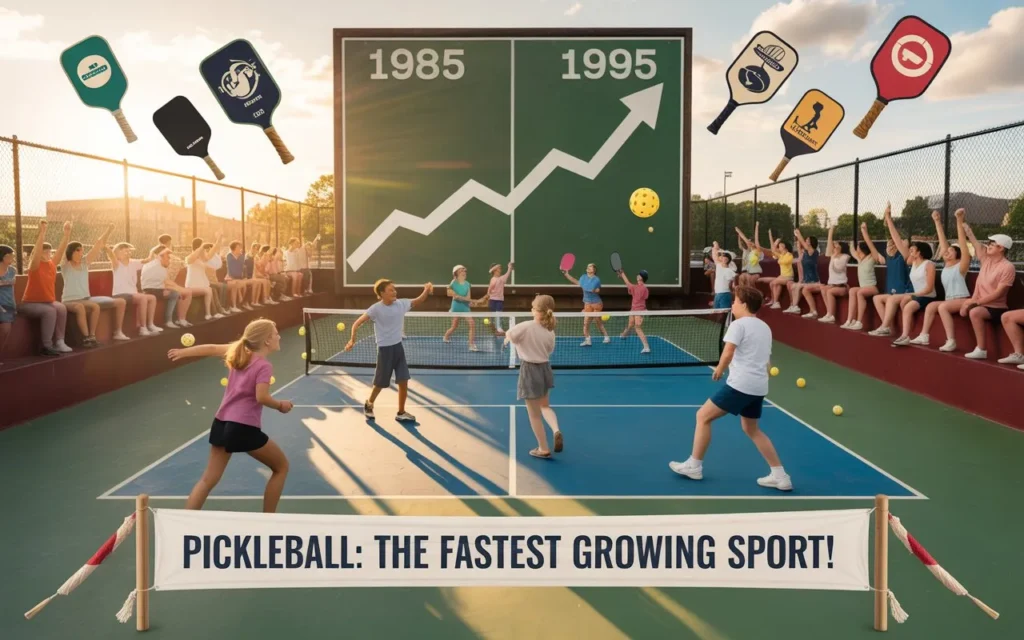Every sport carries a story, but only a few can say they began in a backyard with nothing more than ping-pong paddles and a plastic ball. Pickleball belongs to this rare category. When we ask What is pickleball history, the answer goes beyond simple dates and names. It’s a story about families finding fun, friends inventing rules, and an unexpected journey from casual play to international recognition.
Today, pickleball is the fastest-growing sport in the United States, with millions of active players. Its blend of accessibility, speed, and fun has made it popular across generations. To appreciate where it is going, we must first understand where it came from.
Origins – The Summer of 1965
The tale begins on Bainbridge Island, near Seattle, Washington. Joel Pritchard, a U.S. congressman, and his friend Bill Bell, a successful businessman, came home one summer Saturday after golf. They found their children bored with nothing to do. The property had a badminton court, but the equipment was missing. Improvisation led them to pick up ping-pong paddles and a perforated plastic ball.
Initially, they played with the net at badminton height (60 inches). Soon, they realized the ball bounced better on the asphalt court, and the net was lowered to 36 inches. Within days, Barney McCallum, a handy neighbor, joined them. Together, the three men formalized basic rules, drawing inspiration from badminton and table tennis.
The spirit was clear: create a game simple enough for the whole family to enjoy. And with that, pickleball was born.
Early Developments – Courts and Tournaments
By 1967, Bob O’Brien, a close friend, built the first permanent pickleball court in his backyard. This marked a shift from makeshift play to organized sport.
In 1972, a corporation was formed to protect the new game. The following years brought recognition: in 1975, the National Observer featured an article, and in 1976, Tennis Magazine introduced pickleball as “America’s newest racquet sport.”
The first known tournament was held in 1976 at the South Center Athletic Club in Tukwila, Washington. Many participants were tennis players experimenting with wooden paddles and even oversized balls. This pioneering event laid the foundation for competitive pickleball.
| Year | Milestone | Impact |
| 1965 | Invention | Joel Pritchard, Bill Bell, and Barney McCallum created pickleball |
| 1967 | First Court | Built in Bob O’Brien’s backyard |
| 1972 | Corporation | Legal protection established for the game |
| 1975–76 | Media & Tournament | Articles appeared, and the first competition was held |
| 1984 | USAPA Founded | First official rulebook published |
| 1990 | Played Nationwide | Spread to all 50 U.S. states |
| 2001 | Arizona Senior Olympics | 100 players joined the event |
| 2005 | USAPA Relaunch | Growth accelerated |
| 2009 | First National Tournament | 400 players participated |
| 2016 | US Open Championships | Televised on CBS Sports |
| 2022 | Fastest-Growing Sport | 8.9 million players |
| 2023 | Dallas Nationals | Biggest pickleball event to date |
How Did Pickleball Get Its Name?
The name has long been debated.
Pickle Boat Origin: Joan Pritchard coined the term. In rowing, a “pickle boat” uses leftover rowers. Since the sport combined pieces of tennis, badminton, and table tennis, she thought “pickleball” was the perfect name.
Dog Story: Some neighbors claimed the game was named after the family dog, Pickles, who chased the ball. However, research shows Pickles arrived three years later, in 1968.
Most historians agree that Joan’s rowing-inspired explanation is accurate. The dog tale became popular only because Joel Pritchard once jokingly told it to a reporter.

Growth in the 1980s and 1990s
The 1980s gave pickleball structure. In 1984, the United States Amateur Pickleball Association (USAPA) was created. Sid Williams served as its first president, and the first rulebook was published.
A major breakthrough came with Arlen Paranto, a Boeing engineer, who designed the first composite paddles using fiberglass and honeycomb cores. This innovation elevated the game from backyard fun to a competitive sport.
By 1990, pickleball was played in all 50 states. By the late 1990s, websites and small online communities helped the sport spread even further.
Entering the New Millennium (2000–2010)
Pickleball’s digital era began in 1999 with the launch of Pickleball Stuff, the first online hub.
In 2001, the Arizona Senior Olympics included pickleball, attracting 100 participants. By 2003, over 39 known places to play were listed online.
2005 marked a turning point: USAPA was reorganized, expanding ambassador programs, tournaments, and membership. By 2009, the first official National Tournament was held in Arizona, with nearly 400 players competing from across North America.
Modern Pickleball – The Rise of a Movement (2010–2023)
From 2010 onward, pickleball exploded. The International Federation of Pickleball (IFP) was established to promote global play. By 2015, over 2 million players existed in the U.S.
In 2016, the US Open Pickleball Championships took place in Naples, Florida, with national broadcasts on CBS Sports Network. By 2018, the Margaritaville National Championships in Indian Wells hosted over 2,200 participants and was streamed worldwide.
By 2023, the Sports & Fitness Industry Association (SFIA) confirmed pickleball as the fastest-growing sport for three years in a row, with 8.9 million players in the U.S. Membership in USA Pickleball surpassed 70,000.
Why Pickleball is So Popular
Several factors explain its popularity
Easy to learn for beginners
Lower impact than tennis, making it senior-friendly
Affordable equipment
Suitable for small courts indoors and outdoors
Fun for families, friends, and competitive athletes alike
This accessibility transformed pickleball into a social trend, creating communities where people bond over the sport.
Core Elements of Pickleball
Pickleball Rules
Pickleball rules include underhand serving, the “two-bounce rule,” and the no-volley zone called the kitchen.
Pickleball Court Dimensions
The pickleball court dimensions are 20 x 44 feet, the same as a doubles badminton court.
Pickleball Equipment
The essential pickleball equipment includes a paddle, a perforated ball, and a net. Branded paddles such as the Joola pickleball paddle and the CRBN pickleball have modernized the game.
Pickleball Rackets
Players often refer to paddles as pickleball rackets, highlighting their racquet-sport identity.
Pickleball Scoring
Pickleball scoring allows only the serving team to score, typically to 11 points.
Pickleball vs Tennis
When comparing pickleball vs tennis, pickleball requires less running, smaller courts, and shorter matches, but still offers excitement.
Is Pickleball an Olympic Sport
Is pickleball currently an Olympic sport? No. However, with global expansion and structured federations, many believe it’s only a matter of time.

The Role of Media and Culture
The media amplified Pickleball’s rise. Coverage by Good Morning America, ESPN, CBS, and major newspapers gave it visibility. Professional magazines like Pickleball Magazine and platforms like Pickleball Channel offered dedicated coverage.
Meanwhile, pickleball’s lifestyle side grew. The popularity of Skechers pickleball shoes, Nike pickleball shoes, and pickleball gifts demonstrates their integration into fashion and culture.
Spotlight on the Founders
Joel Pritchard: Congressman and visionary, who wanted family fun over politics.
Bill Bell: A Businessman who loved challenges and innovation.
Barney McCallum: The craftsman who shaped the paddles and rules.
Their legacy is celebrated in the Pickleball Hall of Fame, proving that even small backyard ideas can reshape culture.
FAQs
When was pickleball invented? (H3)
Pickleball was invented in the summer of 1965.
Who invented pickleball? (H3)
Joel Pritchard, Bill Bell, and Barney McCallum are credited as co-founders.
Why is it called pickleball?
Joan Pritchard named it after “pickle boats” in rowing, not the family dog.
Where was pickleball first played?
It was first played on Bainbridge Island, Washington.
Is pickleball played worldwide?
Yes, international clubs and governing bodies now exist on multiple continents.
Conclusion: The Future of Pickleball
So, what is pickleball history? It is a journey from a rainy island in Washington to a global stage. In less than six decades, pickleball has evolved from casual backyard play into a professional sport with millions of players.
As it continues to grow, one thing remains unchanged: pickleball still carries the spirit of fun, family, and innovation. The future may see Olympic inclusion, more international championships, and continued community growth.
Pickleball’s history is living proof that the simplest ideas can change the world.
